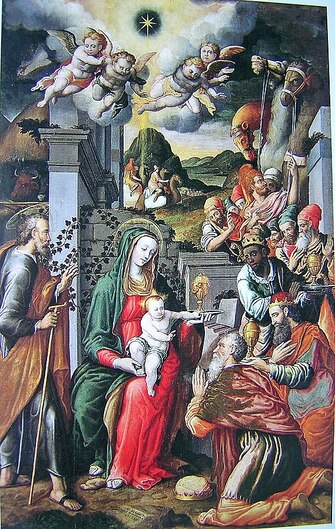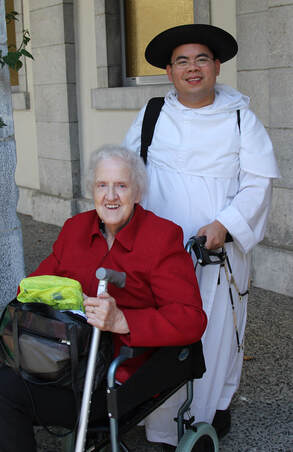|
By the Reverend Sally S. Weaver  Ercole Ramazzani, Public domain, via Wikimedia Commons Ercole Ramazzani, Public domain, via Wikimedia Commons Pastor Sally gave this sermon on January 3, 2021. Just as we do with the weather, the Church marks time in seasons. Beginning Nov 29, we celebrated the Church season of Advent for 4 weeks. Then on Dec 25, we began celebrating the season of Christmas. How long is the Church season of Christmas? I’ll give you a hint – “On the first day of Christmas, my true love gave to me…” Yes, it’s 12 days long, which means it ends on the night of Jan 5. For you Shakespeare buffs, his play Twelfth Night refers to the last day of Christmas; it was written to be performed on Jan 5. On Jan 6 we begin the season of Epiphany. We’re moving Epiphany up a bit, celebrating it today (Jan 3), since we’re together on Sundays. What is the important event that we remember on Jan 6, the day of the Epiphany? Yes, the arrival of the wise men who come to visit the baby Jesus. But why in the world is it called “the Epiphany” rather than “the arrival of guys with gifts.” An epiphany happens when we suddenly understand or see something that we didn’t before. It’s an “ah ha!” moment. Have you ever had the experience of trying to put something back together and you can’t figure out how it goes. You try and you try. Then all of a sudden it’s clear – you have an epiphany -- you see how to reconstruct it. So we said that the Epiphany celebrates the visit of the wise men bearing gifts to the baby Jesus. If this is an epiphany, what is it that is revealed? What is suddenly clear that wasn’t before? What is made clear is: that Jesus is not just for a certain, select group of people called the Jews. Jesus is for everyone. The wise men who visit Jesus are not Jewish. In the place where Jesus lived, people who weren’t Jews were called “Gentiles.” The wise men were Gentiles. The Church’s subtitle for the Epiphany is “the manifestation of Jesus to the Gentiles.” Epiphany is the day we remember the visit of the wise men to Jesus. Epiphany is the day in which these Gentiles, these non-Jewish men, saw Jesus and recognized that this baby came not just for the Jews but for them, too. In fact Jesus came for everyone, then and now. Jesus came for you, your parents, your grandparents, your siblings, your friends, all of us. These men bearing gifts are obviously important to the Church. So let’s look at what we know about them. The passage we just heard from the Gospel of Matthew is all we know from the Bible about these men who visit baby Jesus. How many men were there? We don’t know; Matthew’s Gospel doesn’t tell us. It only says, “wise men from the East.” It wasn’t until the 6th century, 500 years after Jesus, that the notion of there being 3 of them, named Caspar, Balthasar, and Melchior, was created. We just sang “We three Kings.” Now we know that there weren’t necessarily three of them. The men are often referred to as “magi,” which just means wise men. It’s extremely unlikely that the magi were kings. My guess is that the Gospel writer Matthew would be shocked to hear the story told that way. In the text we just heard the wise men ask for the location of the child born king of the Jews. But there’s no indication that they are asking King Herod for that information. Herod learns about their inquiry and calls his scribes and chief priests together to learn the answer to the magi’s question. Then, we’re told, “Herod secretly called for the wise men…and sent them to Bethlehem.” It’s improbable that a king like Herod would be summoning other kings to appear before him and dispatching them on an errand. It’s more likely that these wise men were astrologers and men in a court setting. They would have been servants of their kings. They served and did the bidding of rich and powerful men. They themselves were not rich and powerful, however. Matthew intended there to be only 2 very different kings in this story – Herod the king and Christ the king. So why do we celebrate the appearance of an indeterminate number of wise men of servant status from the courts of unknown kings to the child Jesus? We celebrate the Epiphany because it is a story of faith that resonates with us. It is our story. Like the magi, we are people on a spiritual quest. We seek to find Christ, to pay homage to him as our Lord and Savior. As people on a journey we would do well to imitate the magi. They did lots of things right. They didn’t know the way; they weren’t sure of the path. But they knew if they followed the light of Christ they would find what they were longing for.
Like the magi, we are people who serve rather than wield the power and wealth of kings. And like the magi, once we encounter Christ we realize that there will be times when we’ll have to choose between serving the rulers of this world and our God. It’s hard not to put our trust in the power of force. But the story of the magi reminds us that real power resides in a God who takes the form of a helpless infant. It’s the healing power of Jesus, not the political power of Herod, that leads to justice, freedom from oppression, and peace. Matthew tells us that the magi are “warned in a dream not to return to [King] Herod” and so they return home by another road. Now, this is the part of the story that I personally find most amazing. I am a person with absolutely no sense of direction. When my husband Tony gave me a GPS for my car he said to me, “This is something you’ve needed your entire life.” He was right. I can get lost in neighborhoods I’ve lived in for years. If I had been one of the magi I wouldn’t have been able to get home following the same way I’d come, let alone by a different route. But the deeper truth in this piece of the story is that once the magi had seen Jesus, any way home was a different road. As we all are, they had been transformed by their encounter with Christ. The magi couldn’t go back the way they had come, because that path didn’t exist for them anymore. Through our faith Christ leads us to him and his eternal home. When we set our heart on Christ, all paths lead us home. Let us pray: Lord Jesus, we come like the magi, offering back to you all the gifts you so freely lavish on us. Light our path. Help us to remember to journey together and to ask directions when we feel lost. And fill us with the knowledge that all roads that lead to you will bring us home. Amen. The Reverend Sally S. Weaver is priest-in-charge at St. John's.
0 Comments
Leave a Reply. |
Editorial contactVarious members of the St. John's congregation contribute to this blog. For editorial suggestions, contact Jeff McIntire-Strasburg at [email protected] Archives
May 2024
CategoriesAll Bishop Deon Johnson Book Group Congregation Members Deacons Diocese Of Missouri Episcopal Church Features General Information Parish Events Podcast Presiding-bishop-michael-curry Sermons Terms-of-transition Vestry |

 RSS Feed
RSS Feed

